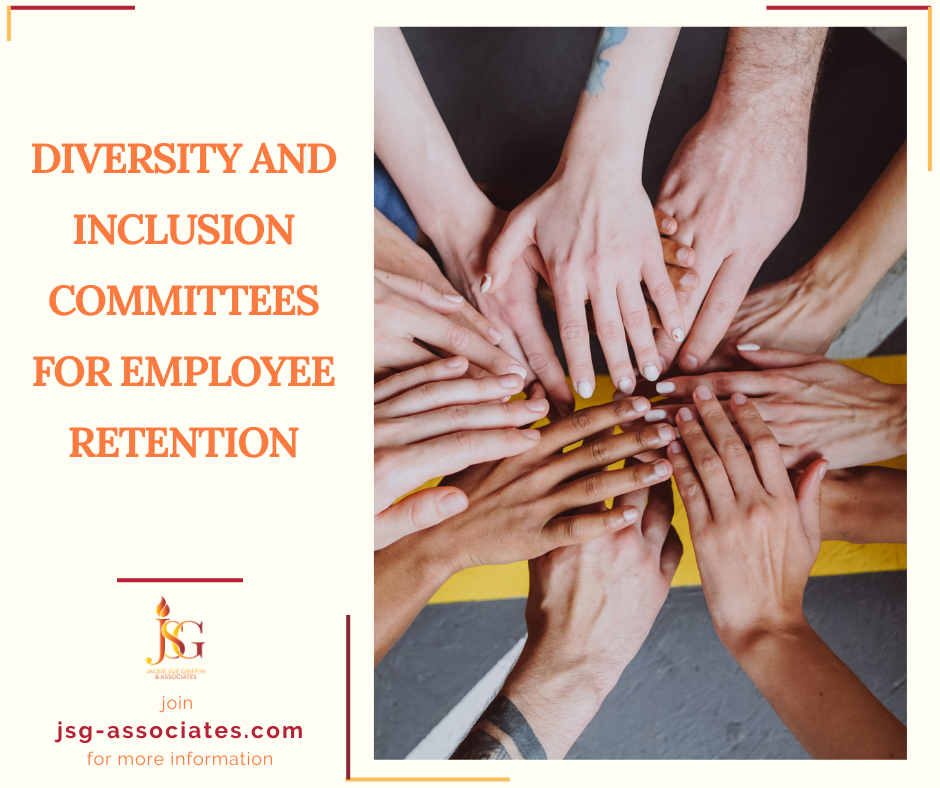
17 Jun Effectiveness of Diversity and Inclusion Committees for Employee Retention
Employee turnover is a huge issue for nonprofits and can be a drain on resources that can lead to confusion, discouragement, and additional expenses related to interviewing and training new staff. This makes sustainability for key services and programs even more of a challenge – and sometimes even resulting in not being awarded new funds or being able to maintain granted funds. One way we address employee retention is to incorporate diversity, equity and inclusion (DEI) efforts as it help make a statement of positive change in your organization.
By consciously placing importance on DEI, your organization can foster a workplace culture where all employees feel valued, respected, and empowered – as well as sustained. One way to accomplish the fostering of DEI is through specialized voluntary committees. Committees promote a more inclusive workplace while also playing a valuable role in employee retention. Let’s explore the effectiveness of DEI committees in retaining employees and the benefits they bring to an organization.
What is a Diversity, Equity and Inclusion Committee?
Diversity, Equity and Inclusion committees are groups of people within an organization dedicated to promoting diversity, equity, and inclusion. These committees often consist of employees from various departments and levels, discussing the diverse makeup of the organization. Their primary goals include:
- Raising Awareness: Educating employees about the importance of diversity and inclusion.
- Creating Policies: Developing and implementing policies that promote a more inclusive workplace.
- Providing Support: Offering resources and support for employees from diverse backgrounds.
- Monitoring Progress: Tracking the organization’s progress in achieving its diversity and inclusion goals.
How do DEI Committees Impact Employee Retention?
Employees who feel included and valued are more likely to be engaged in their work. DEI committees can work together to create an environment where employees from all backgrounds feel welcome and appreciated. By promoting diversity and fostering inclusion, these committees ensure employees can bring their whole, true and authentic selves to work. Engaged employees are not only more productive but also more likely to stay with the organization.
Additionally, when DEI efforts are in place, this is something that can be used in grant writing, portrayed in through mission matching, and ensuring appropriate pay and understanding of the workforce. All important factors in keeping a well-retained staff.
Improved Job Satisfaction
Ensuring your employees feel satisfied with their work is vital to employee retention. When employees feel that their company is inclusive and welcoming as well as understanding their own diverse backgrounds, they are more likely to be satisfied with their jobs. DEI committees work to ensure all employees have equal opportunities for growth and development.
Stronger Organizational Culture
An inclusive workplace culture is attractive to both current and future employees as well. DEI committees play a crucial role in shaping this culture by organizing events, training sessions, and initiatives that celebrate diversity. When organizations actively work towards inclusion, their employees feel a greater sense of belonging and loyalty, which translates to higher retention rates.
Enhanced Professional Development
DEI committees can also serve to provide mentorship programs, training, and career development opportunities for employees from underrepresented groups. These initiatives help employees develop their skills and advance in their careers. When employees see a clear path for growth and development within the organization, they are more likely to stay long-term.
Better Conflict Resolution
Workplaces with employees of diverse backgrounds can sometimes experience misunderstandings or conflicts. DEI committees help address these issues by fostering open communication and providing conflict resolution resources. Feeling heard is essential for employees to sense value, and when organizations prioritize their employees, they value their place within the organization.
Challenges We Face when Pursuing Change
While DEI committees are effective, they can also face challenges. Some common issues include:
- Lack of Resources: DEI committees may struggle with limited resources and support from management. However, turnover is an expense that can sneak up on organizations and drain budgets without management even realizing. When organizations begin to allocate resources to inclusive workplace culture, they can lower the cost of turnover by prioritizing their employees’ needs.
- Resistance to Change: Employees or leaders resistant to change can hinder the progress of DEI initiatives. But these committees are a way to hold leadership accountable for the initiatives their organization’s mission is supposed to support. This system can overcome barriers to changes through putting a spotlight on these initiatives and providing insights into fostering a creative and diverse environment where employees can be their best selves without fear or judgement.
- Measuring Impact: It can be challenging to measure the impact of DEI efforts. Organizations should use anonymous surveys and interviews to judge the qualitative impact of these efforts on the workplace culture. Quantitative measurements can come from long term retention rates for employees.
DEI committees are instrumental in fostering a culture that respects all employees and values differences. By promoting diversity, ensuring equity, and fostering inclusion, these committees help enhance employee engagement, job satisfaction, and retention. Organizations that invest in DEI committees not only create a more inclusive environment but also find a competitive advantage by retaining top talent. In a world where diversity and inclusion are increasingly recognized as critical to success, DEI committees are essential for building a thriving, sustainable organization.

No Comments